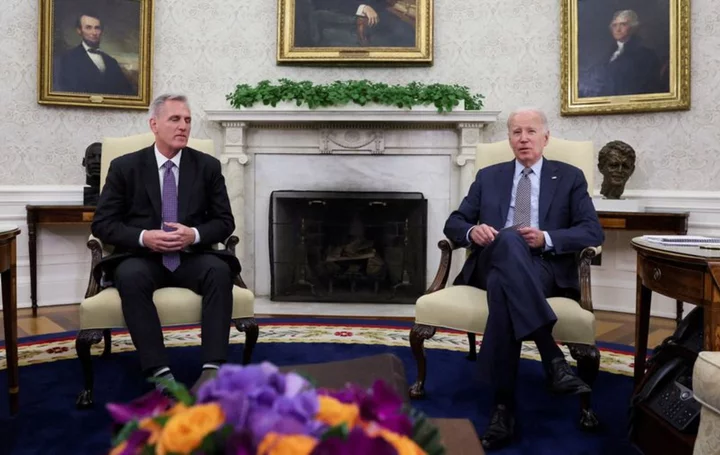By Trevor Hunnicutt
WASHINGTON The deal to end the United States' debt limit standoff was classic Joe Biden politics: eke out a narrow compromise from an ugly beginning and declare victory.
It has deeper meaning as well.
Biden's pact with Republican Kevin McCarthy, who once voted to overturn the president's 2020 election win, became law on Saturday. It suspends the $31.4 trillion U.S. debt ceiling, avoiding an economic crisis, in exchange for setting spending caps in the coming two fiscal years.
It also represents a step towards a key campaign promise: he will make bipartisanship succeed in Washington, and ultimately restore "the soul of the nation" by getting Americans to work together again.
But it remains to be seen whether narrow victories in Congress can help push the United States from the extremist path displayed in the Jan. 6, 2021, storming of the Capitol.
Biden has been "trying to strike a chord that we need to put our partisanship aside so that we can better govern the country," said family friend, Bishop Silvester Beaman, who gave the benediction at Biden's inauguration. "That's easier said than done."
So far, agreements on deeper issues that Biden and Democrats promised to tackle, from police brutality to protecting voting rights to a battle over women's right to abortion remain out of reach with Republicans. Biden's own popularity has withered over the course of his term, with some Democrats pointing fingers at the very strategy he touts.
"A lot of Americans are very disaffected by mainstream politics and by the compromises that the Democrats have made," said Premilla Nadasen, a professor of history at Columbia University's Barnard College.
Over two years in office, Biden has crafted agreements on narrow issues, often with political opponents who have questioned his fitness, legitimacy and values.
The result is a string of legislative compromises on veteran healthcare, semiconductor chips, infrastructure spending and federal judges - more than 350 bipartisan bills overall, the president told Americans on Friday night.
"I know bipartisanship is hard, and unity is hard," Biden said during his first-ever Oval Office address on Friday. "No matter how tough our politics gets, we need to see each other not as adversaries, but as fellow Americans. Treat each other with dignity and respect. To join forces as Americans to stop shouting, lower the temperature, and work together."
Deals with Senate minority leader Mitch McConnell and Senate swing-vote Joe Manchin on infrastructure, climate and guns reflect Biden's deal-making strategy over 50 years in politics. But he has also tailored them to what he privately calls the extreme division of the moment, aides and advisers say - hoping to show that government is serving all voters' interests, not the captured, deep-state conspiracy to thwart them that some hard line Republicans believe.
Washington can be an example for the rest of the nation, some historians believe.
"How best to contain the anti-democratic conspiratorial right in America - that is the project that you're seeing Biden work on," said Matthew Dallek, a political historian and professor at George Washington University.
Biden's focus is on showing as many people as possible that the two parties can still govern and bureaucracies can still function, he said.
"If you let the dysfunction run amok, it plays into the argument of anti-government extremists. It ratifies their argument that government is conspiring as a deep state against people's interests and that it needs to be blown up."
Biden has applied the across-the-aisle strategy outside Capitol Hill, too.
Mitch Landrieu and other top Biden advisers recently negotiated an electric vehicle charger agreement with Elon Musk, the Tesla Inc billionaire who has called Biden a "damp (sock) puppet," and has expressed support for Ron DeSantis, who is seeking the Republican presidential nomination.
"This is what's amazing about working for this president: irrespective of what other noise is going on, outside of whatever it is that you're talking about, he's focused on solving the problem," Landrieu said.
The debt ceiling deal has left neither side fully satisfied - and the top Republicans and Democrats who crafted it say that's just the way it should be. Senate Minority leader Mitch McConnell said after the deal was struck that "divided government means negotiated deals - it means nobody gets everything they want."
The brief peace in Washington after the deal may be short-lived, however, some political strategists warn.
Matt Bennett, at the center-left think tank Third Way, said the benefits may not last as the 2024 campaign nears, and the dominant voice of the Republican party again becomes Trump or someone with a similar aggressive style of politics.
"If this bill bought a reprieve from extreme partisan warfare, it's temporary," he said.
(Reporting by Trevor Hunnicutt; Editing and additional reporting by Heather Timmons; Editing by Chizu Nomiyama)









